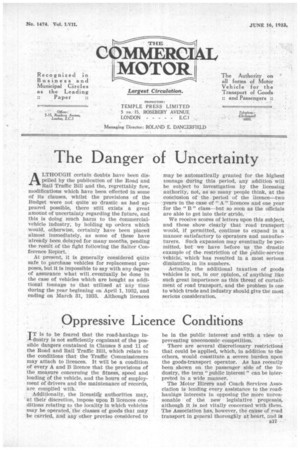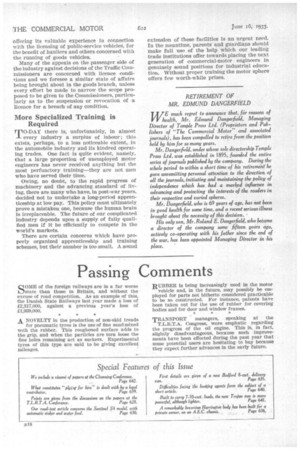Oppressive Licence Conditions
Page 35

Page 36

If you've noticed an error in this article please click here to report it so we can fix it.
IT is to be feared that the road-haulage industry is not sufficiently cognizant of the possible dangers contained in Clauses 8 and 11 of the Road and Rail Traffic Bill, which relate to the conditions that the Traffic Commissioners may attach to licences. It will be a condition of every A and B licence that the provisions of the measure concerning the fitness, speed and loading of the vehicle, and the hours of employment of drivers and the maintenance of records, are complied with.
• Additionally, the licenshik authorities may, at their discretion, impose upon B licences conditions relating to the locality in which vehicles may be operated,-the classes of goods that may be carried, and any other proviso considered to be in the public interest and with a view to preventing uneconomic competition.
There are several discretionary restrictions that could be applied, which, in addition to the others, would constitute a severe burden upon the goods-transport operator. As has recently been shown on the passenger side of the industry, the term "public interest" can be interpreted in a wide manner.
The Motor Hirers and Coach Services Association is lending every assistance to the road haulage interests in opposing the more unreasonable of the new legislative proposals, although At is not vitally concerned with them. The Association has, however, the cause of road transport in general thoroughly at heart, and is offering its valnable experience in connection with the licensing of public-service vehicles, for the benefit of hauliers and others concerned with the running of goods vehicles.
Many of the appeals on the passenger side of the industry against decisions of the Traffic Commissioners are concerned with licence condi'tions and we foresee a similar state of affairs being brought about in the goods branch, unless every effort be made to narrow the scope proposed to be given to the Commissioners, particularly as to the suspension or revocation of a licence for a breach of any condition.
More Specialized Training is Required
TO-DAY there is, unfortunately, in almost every industry a surplus of labour ; this exists, perhaps, to a less noticeable extent, in the automobile industry and its kindred operating trades. One fact is quite evident, namely, that a large proportion of unemployed motor engineers has never received anything but the most perfunctory training—they are not men who have served their time.
Owing, no doubt, to the rapid progress of machinery and the advancing standard of living, there are many who have, in post-war years, decided not to undertake a long-period apprenticeship at low pay. This policy must ultimately prove a mistaken one, because the human brain is irreplaceable. The future of our complicated industry depends upon a supply of fully qualified men if it be efficiently to compete in the world's markets.
There are certain concerns which have properly organized apprenticeship and training schemes, but their number is too. small. A sound extension of these facilities is an urgent need. In the meantime, parents and guardians should make full use of the help which our leading trade institutions offer towards,placing the next generation of commercial-motor engineers in genuinely sound positions for industrial education. Without proper training the motor sphere offers few worth-while prizes.
RETIREMENT OF MR. EDMUND DANGERFIELD E much regret to announce that, fOr reasons of health. Mr. Edmund Dangerfield, Managing Director of Temple Press Ltd. (Proprietors and Publishers of "The Commercial Motor" and associated journals), has been compelled to retire from the position held by him for so many years.
Mr. Dangerfield, under whose sole directorship Temple Press Ltd. was established in 1895, founded the entire series of journals published by the company. During the whole period to within a short time of his retirement he gave unremitting personal attention to the direction of all the journals, initiating and maintaining the policy of independence which has had a marked influence in advancing and protecting the interests of the readers in their respective and varied spheres.
Mr. Dangerfield, who is 69 years of age, has not been in good health for some time, and a recent serious illness brought about the necessity of this decision.
His only son, Mr. Roland E. Dangerfield, who betame a director of the company some fifteen years actively co-operating with his father since the end of the war, has been appointed Managing Director in his place.






































































































